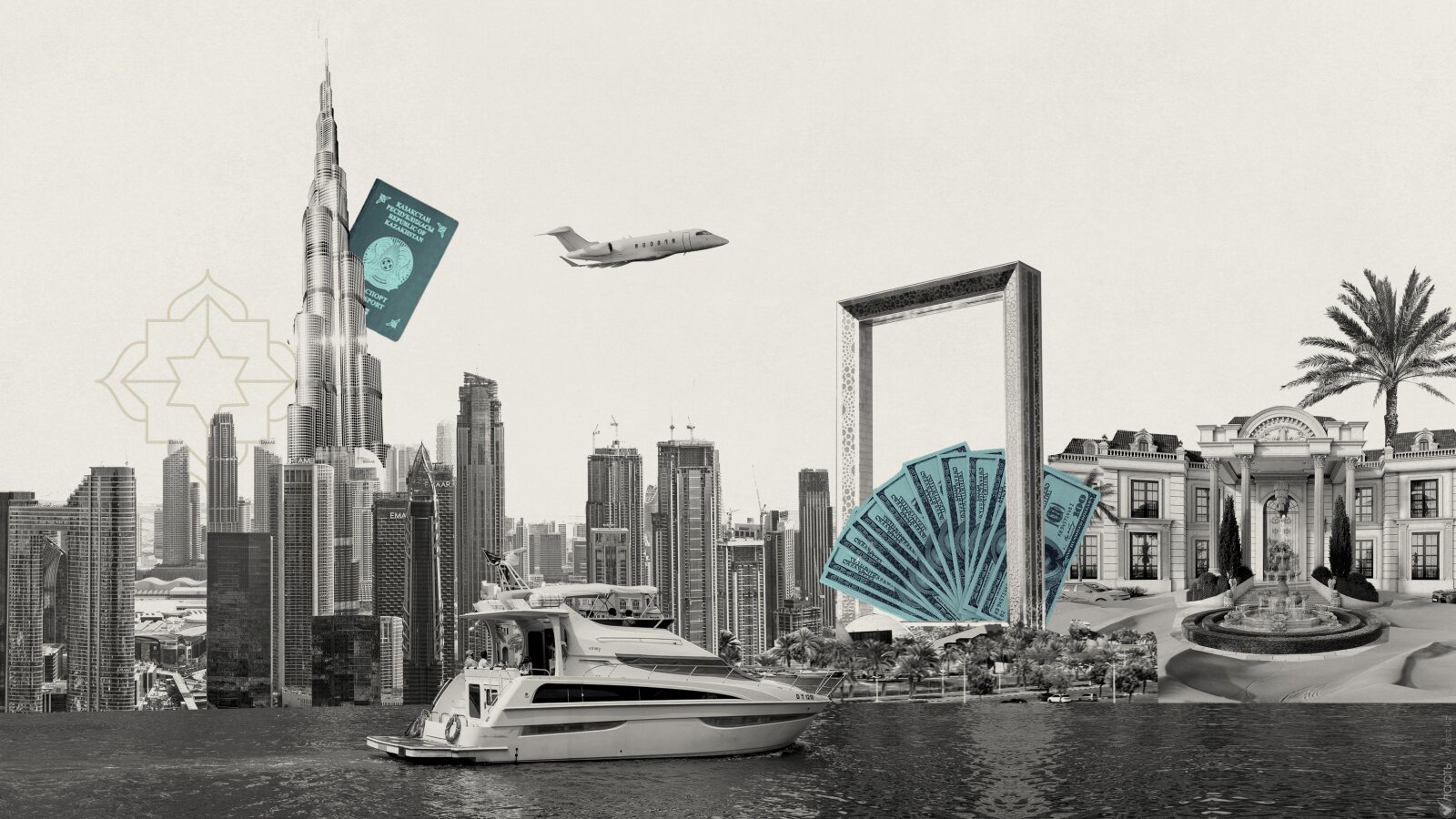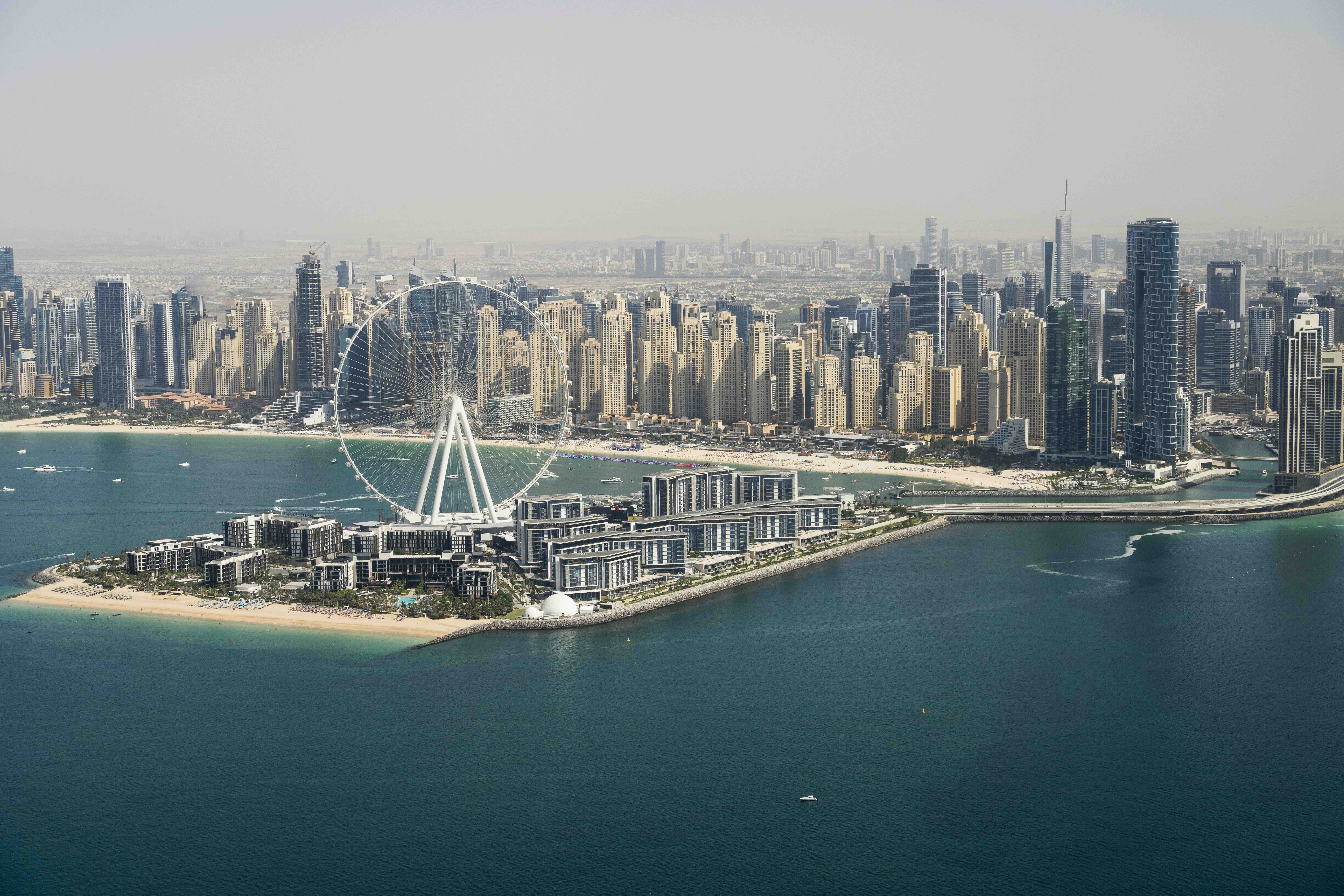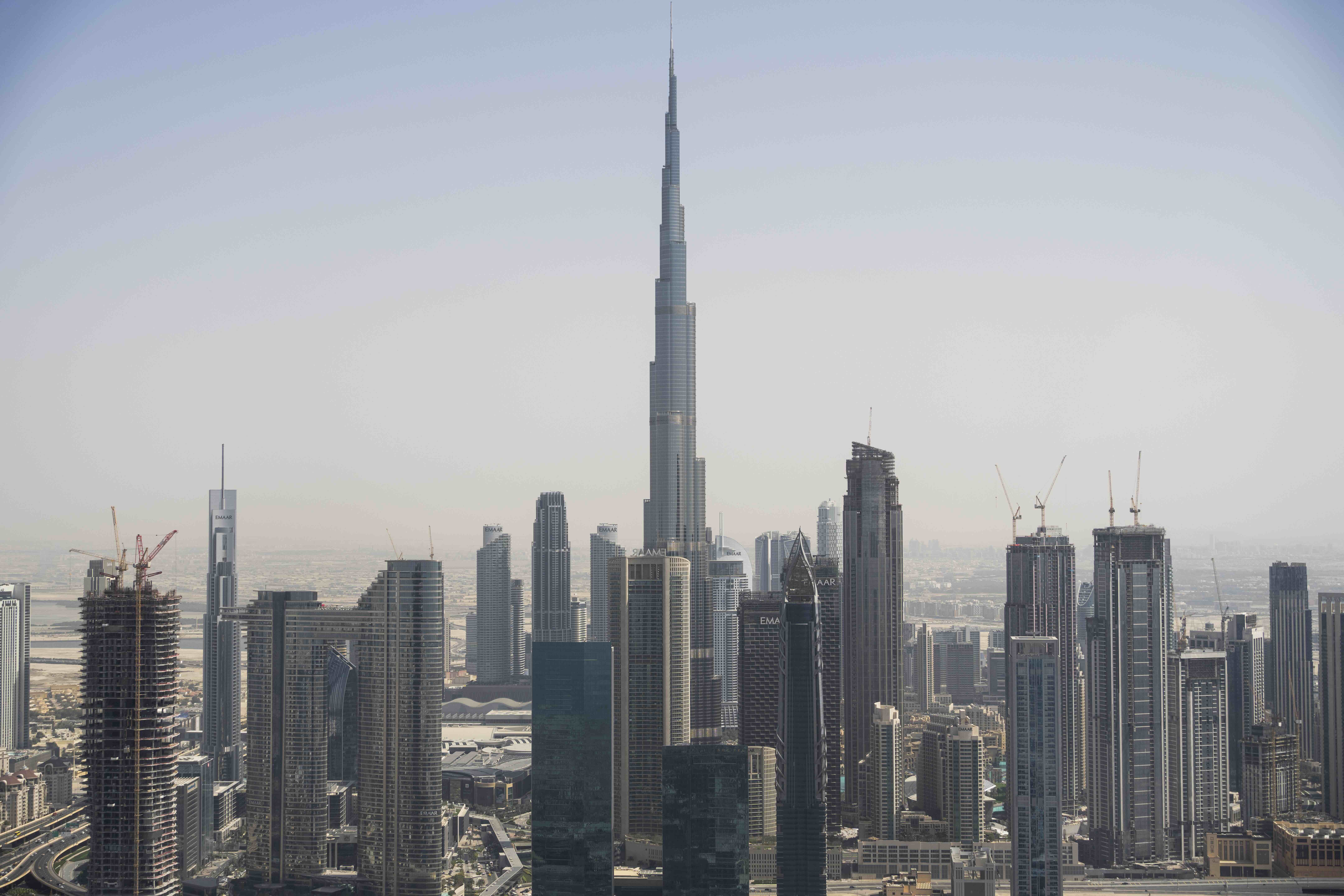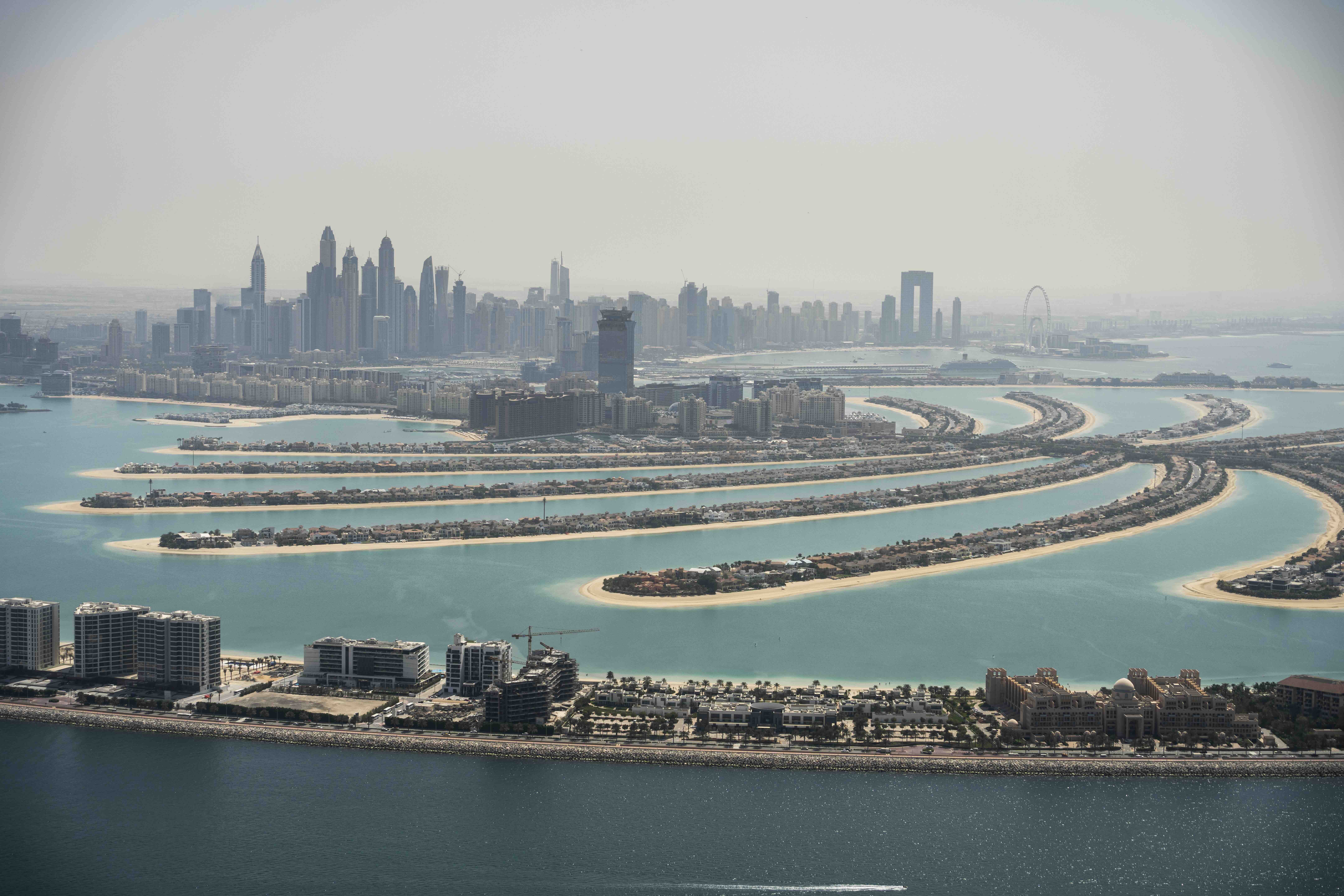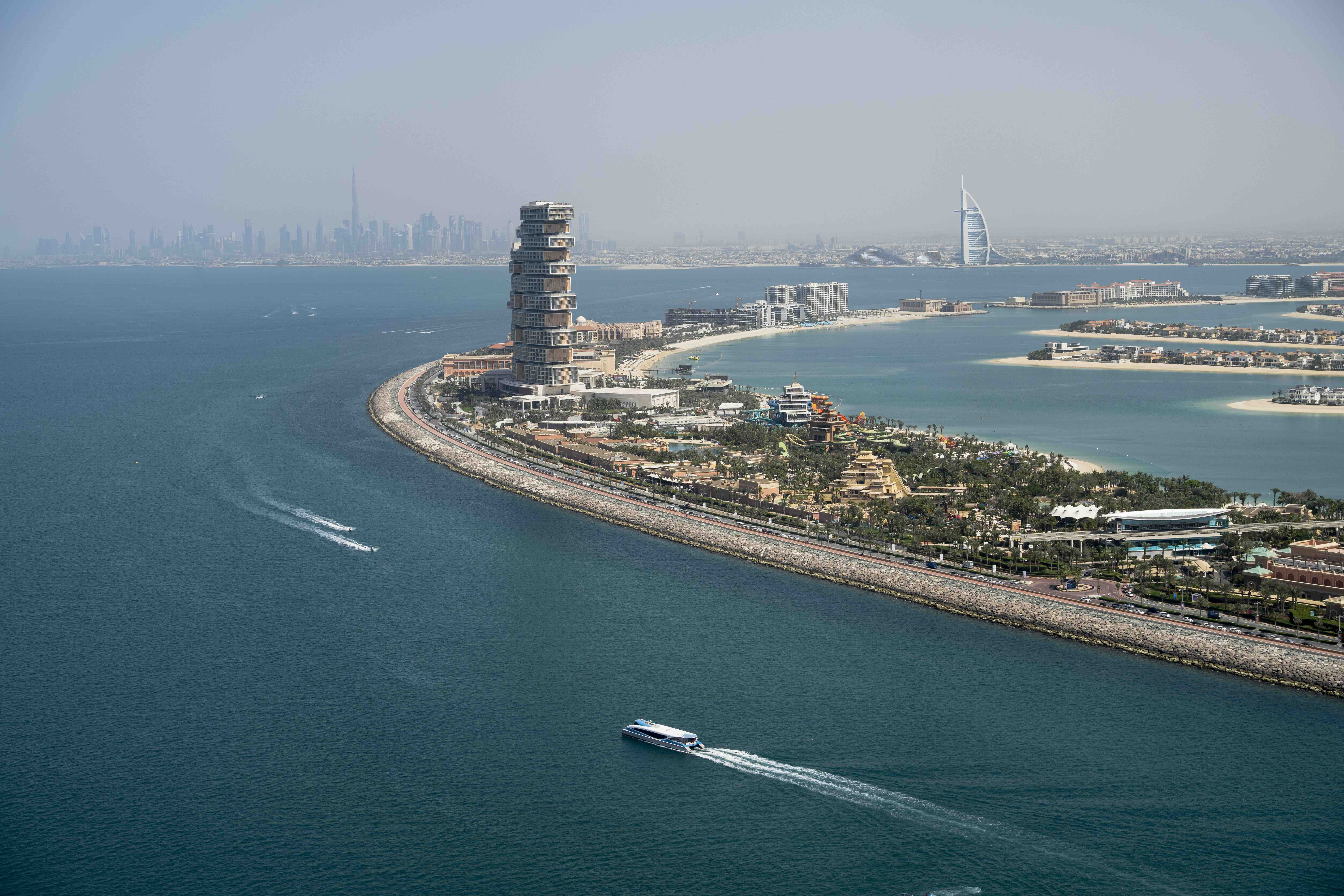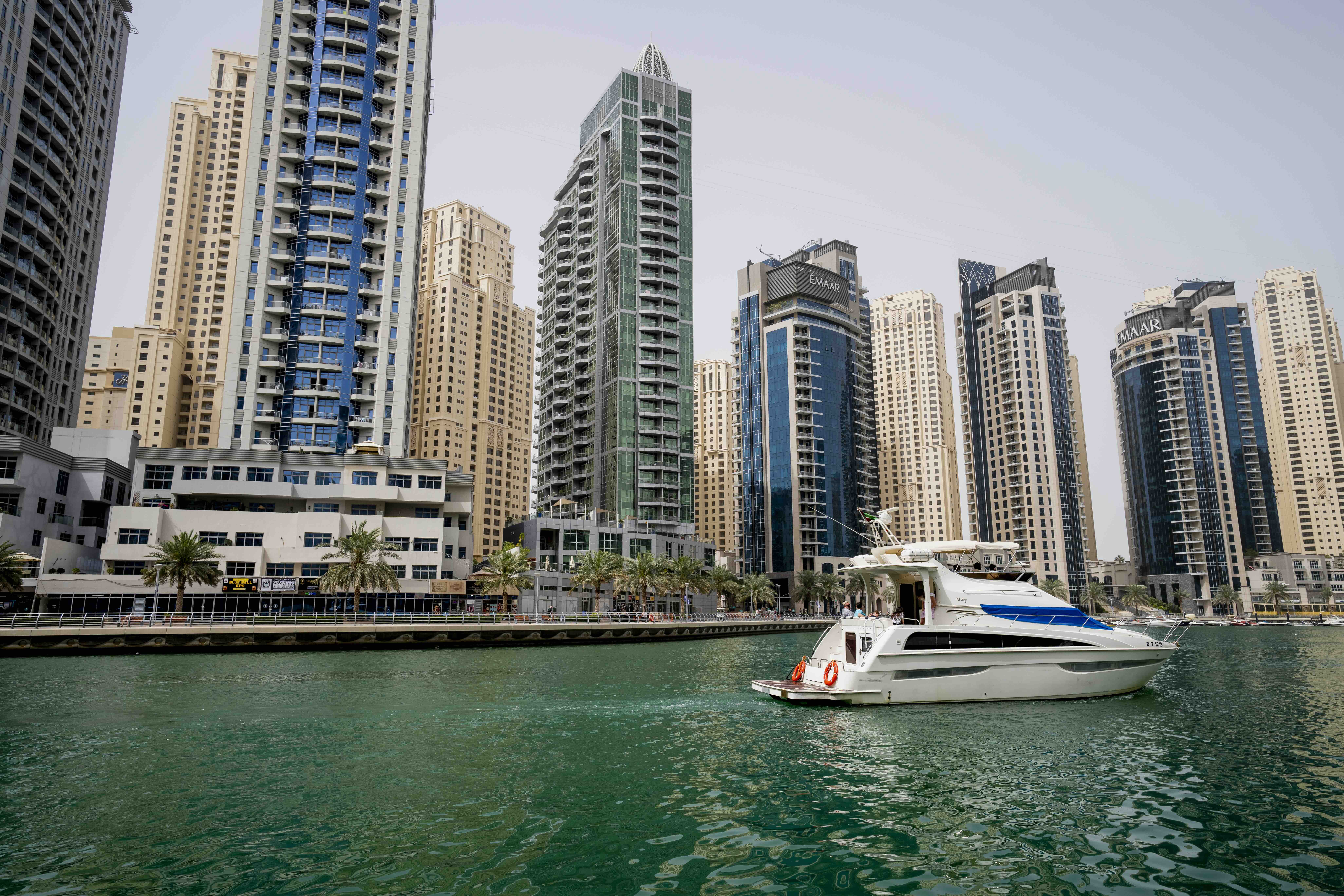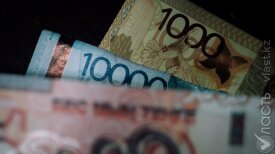Thirty-years-old Magzhan lives in Almaty and works in a bank. He hopes to make a career in IT. Together with his parents, both doctors, he had been saving money for several years to reach their dream of owning an apartment in Dubai, a place to go for vacation and occasionally rent out.
This spring, Magzhan and his parents went to Dubai to discuss the deal. They had managed to save about $200,000, which was not enough for the large apartment they would have liked, but enough to buy a small property in a luxury residential complex in Palm Jumeirah, one of the artificial islands of Dubai, where everything is imbued with wealth and luxury.
Осы мақаланың қазақша нұсқасын оқыңыз.
Читайте этот материал на русском.
Here, it will be easy for Magzhan’s family to integrate into local life and find friends. Palm Jumeirah, like Dubai Marina, is one of the most sought-after areas in Dubai where successful Kazakhstanis purchase real estate, either for living or as an investment.
This emerged from a data leak on property owners in the city, mainly for 2022 and 2020. It was originally obtained by the Center for Advanced Defense Studies (C4ADS), a Washington DC-based nonprofit that researches international crime and conflict. It was then handed over to the Norwegian financial agency E24 and OCCRP, which coordinated Dubai Unlocked, a global investigation involving journalists from 72 media outlets in 57 countries.
Many of those who bought property in Dubai took advantage not only of its affordability, but also of scant due diligence. Dubai and Emirati authorities asked very few questions about the origin of future residents’ money. These conditions began to change after the FATF (Financial Action Task Force) added, in 2022, Dubai to its “grey list” of jurisdictions with weak measures to combat money laundering.
But Dubai is still a long way from full transparency, as is full disclosure of the data of those who have invested in its luxury real estate.
“Everyone who wanted to buy property already did it”
“People with money have owned real estate here for a long time. This is why, in recent years there has not been a large influx,” a financial consultant who helps foreigners, including Kazakhstanis, to invest in Dubai told Vlast.
“Those who bought real estate 10-15 years ago, made a very profitable investment. Real estate prices were skyrocketing. The UAE is an oil country that has money and can financially support long-term construction projects with grandiose plans,” realtor who worked in Dubai and helped Kazakhstanis buy real estate there, told Vlast.
“If people buy real estate there for investment, then they aim at the most popular price segment, that is, from $100,000 to $300,000 per apartment. Sometimes Kazakhstanis buy entire floors of real estate,” she said. “If someone buys real estate for themselves, they charge more. They buy apartments for $1-2 million and more.”
Dubai’s economy hinges on a special development model, founded on special economic zones, a free trade regime, and modern seaports. This model gave the city the status of a strategic hub for a massive flow of goods, people, and capital.
In the early 2000s, Dubai’s economy grew the fastest. This was when investors from all over the world began to pour huge amounts of money in the city. A favorable business climate, with easier bureaucracy and tax benefits in addition to free trade zones, was a pull factor.
The megaprojects of the Palm Islands and the Burj Al Arab hotel also helped boost the economy. At once, Dubai authorities eased legislation restricting foreigners from buying real estate and relaxed checks regarding the legal origin of funds investors would use. Together, this contributed to the rapid expansion of the real estate market.
Weak regulation has interlinked the advantages provided by free trade zones and a booming real estate market, and turned Dubai into a fertile ground for illicit financial activities, including money laundering.
One financial consultant who works with Kazakhstanis confirmed that real estate in Dubai is often not registered in the names of the real owners.
Kazakhstanis “don’t particularly like to register real estate in their own name,” she explained. “Businessmen who have large incomes own real estate officially, their wealth can be traced in Forbes and so on. They register new property for themselves or for their family. Public officials, of course, will not put ownership under their own names; they have several middlemen to choose from,” the consultant told Vlast.
Money laundering in real estate in Dubai usually follows a complex pattern. First, illegally acquired funds are poured into the real estate market through the purchase of finished properties or the construction of new ones. Second, a series of financial transactions based on these properties are carried out in foreign jurisdictions in order to hide the origin of the funds. Third, the money is legalized using documents stating that they were received from real estate transactions.
“Although some efforts have been made recently to bolster anti-money laundering processes, the UAE is seen as a jurisdiction to easily transfer assets to, with few questions asked,” Kate Mallinson, director at PRISM Political Risk Management and associate fellow at Chatham House in London, told Vlast.
“The Nazarbayev government regarded the UAE as a potential safe haven in the event of any challenges to their rule, and had been developing relations with, and donating money to the UAE ruling elites,” Mallinson said.
As follows from the current data leak, in Dubai in 2022, several members of the family of former President Nursultan Nazarbayev owned real estate: His wife Asel Kurmanbayeva, his nephew Kairat Satybaldy (with his mother, two wives and their children), as well as members of the family of Berik Imashev, whose daughter is married to Nazarbayev’s grandson. Plus, Korlan Sharipbayeva, the daughter of Kairat Sharipbayev, the husband of Nazarbayev’s eldest daughter Dariga, as well as members of the Kulibayev family, linked to Nazarbayev through his middle daughter Dinara.
People from the former president’s inner circle, as well as his family, also owned real estate here, including several businessmen associated with Bolat Nazarbayev, the ex-president’s younger brother, who died last year.
The list is probably not complete, given the habit of registering real estate under nominal owners, as well as the fact that not all information about Dubai real estate has become available to journalists. There have been no leaks yet about property owners in Abu Dhabi, one of the most popular destinations for offshore investment among Kazakhstan’s elite.
Change on the Horizon?
After Dubai was added to the FATF “gray list,” the Emirati authorities have mulled various measures aimed at combating money laundering through the purchase of real estate in the city.
“Dubai is not a safe haven for illicit funds for illicit actors. Dubai is a safe haven for legitimate commerce, for legitimate individuals who are hardworking and have earned what they have otherwise,” Saud Abdulaziz Amutawa, an officer with the Dubai Police anti-money laundering unit, said in an interview with Swedish TV channel SVT, one of the partners of the global Dubai Unlocked project. .
In February this year, Emirati authorities received good news: The FATF would ease measures against Dubai, noting “significant progress” in the fight against money laundering.
At the same time, Kazakhstan adopted, after many years of resistance, a mechanism for declaring assets. This year it will be the turn of civil servants, next year, entrepreneurs, and the following year, everyone else.
At the beginning of 2024, deputy finance minister Yerzhan Birzhanov reported that over 2,000 civil servants had already declared ownership on almost 2,500 real estate properties in more than 50 countries around the world. Birzhanov named Russia, Turkey, and Azerbaijan as countries where the assets of Kazakhstan’s civil servants are predominantly concentrated.
Importantly, however, the declarations of officials and deputies still remain outside public oversight.
This project is an attempt to bring to the public at least part of the information regarding assets of officials and members of their families abroad.
The ministry of finance and the Anti-Corruption Agency, in response to requests from Vlast, reported that the declarations of officials and deputies will become public starting next year. Both departments were unable to specify what information from the declarations will be made public. The head of the ministry of finance had previously said he doubted that Kazakhstanis would understand anything in the declarations, even when they are public.
In Kazakhstan, declaring assets “is the responsibility of every person,” noted a financial consultant who helps conduct real estate transactions in Dubai. “Naturally, the Emirates will not force you to report to Kazakhstan from here about your real estate. Especially if this property is not registered to the real owners,” she told Vlast.
The work on the return of illegally-withdrawn assets to Kazakhstan, which is carried out by the Prosecutor General’s Office and other law enforcement agencies, also remains confidential. A special commission under the prime minister determines a list of people whose assets can be checked, but does not make it public. And assets returned from abroad are presented to Kazakhstanis only in the form of abstract figures, without any specification regarding the ownership and the rationale for the confiscation.
All this creates conditions for Dubai, along with other tax havens, to remain an attractive place for investing money, including for high-ranking officials.
“Dubai is presumably a convenient place for Kazakhstan’s richest to keep their wealth, and still looks like a safe bet,” Joanna Lillis, a Kazakhstan-based journalist and author of Dark Shadows: Inside the Secret World of Kazakhstan, told Vlast.
She also mentioned that some members of the family of the former president faced checks in the UK on the origin of their funds.
“Russia’s invasion of Ukraine, the imposition of financial sanctions, and the exposure to scrutiny of the use of Western jurisdictions to squirrel away illicit assets are probably a key motivation for the Nazarbayev family to choose Dubai to park their wealth these days,” Lillis said.
The interest of foreign investors in the Dubai real estate market has remained steady for more than 20 years. It fell only once, during the Global Financial Crisis of 2008.
However, thanks to the financial support of the UAE authorities, as well as the announcement of plans for the construction of real estate worth $50 billion for EXPO 2020, the crisis was overcome. Already in the first quarter of 2015, Dubai real estate showed an almost 30% increase in price, the largest among all global markets. Since then, with the exception of the pandemic period, Dubai real estate has continued to be in high demand, both for investment and for speculative purposes.
Wealthy and politically-exposed Kazakhstanis, albeit less actively than before, will continue to buy real estate in Dubai. So far, the lack of transparency in both Dubai and Kazakhstan have meant that data leaks have been the only way for this information to become public.
Поддержите журналистику, которой доверяют.
